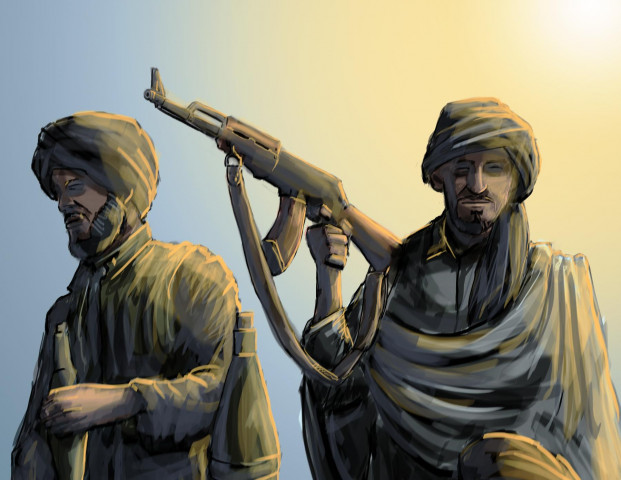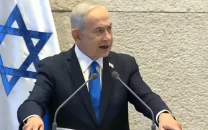Peace matters: For families of victims, hope and skepticism go hand in hand
Some still consider dialogue with militants a viable option.

I have fought and struggled against these militants, but I still do not understand their agenda, says Mukamal Shah. ILLUSTRATION: JAMAL KHURSHID/FILE
There has been a mixed response among the general public to the incoming government offering an olive branch to the Tehreek-e-Taliban Pakistan (TTP) – especially those who lost their loved ones in the ongoing wave of bomb blasts and terrorism in Khyber-Pakhtunkhwa (K-P).
Perhaps after losing nearly 50,000 people to the war on terror, fatigue is setting in and even those who have suffered personal loss seem eager to try talking with militants in order to achieve much needed stability and security in the region.
However, there are still some who believe dancing with militants is futile, especially after taking into account the Awami National Party (ANP)-led provincial government’s efforts in Swat. They believe peace negotiations with militants can never be fruitful.
The head of the Masho Gagar Aman Lashkar, Mukamal Shah told The Express Tribune he had lost three cousins in militant attacks, but is under the impression the war between militants and the government does not benefit either side.

“I have lost an in-law and two cousins. One of them was a jail police official who was kidnapped and killed by militants. My in-law was slaughtered like an animal in Khyber Agency,” said Shah.
Shah believes war is not a solution to any problem, in spite of his tragic loss. “There is no harm in engaging militants in peace talks,” he persisted.
“I have fought and struggled against these militants, but I still do not understand their agenda. Do they want a particular system of government, their own writ in the country, or just glory out of this war – I have no idea.”
But the aman lashkar leader is still optimistic, “I would support the government’s efforts for peace without hesitation.”
However, in Adezai, Pakistan Muslim League-Nawaz worker Farmanullah is not too sure whether trusting militants to honour any deal is a smart idea. His elder brother Dilawar Khan founded an aman lashkar in 2008. The laskhar was abandoned in 2012 due to differences with local police. According to Farmanullah, everyone wants harmony in the country but “peace with militants is not possible as they are eager to establish their own writ and act like a state within a state.”
“Consider the example of Swat, where militants bought time under the cover of a peace agreement and eventually became far more dangerous. It took billions of rupees and thousands of troops to clear the valley,” reminded Farmanullah. However, if militants were willing to lay down their arms, then it would be a real welcome development, he added.
Muhammad Naseeb, a computer engineer by profession, lost his brother-in-law in a bomb blast on Arbab Road, Saddar two years ago. Even so, he is convinced “the time has come to consider the future and forget about the past. After all, we can change our future and make it brighter.” Naseeb feels the government should engage with the TTP and related militant groups in talks, but warns “there were several independent groups among the militants, as well as some posing to be militants.” Perhaps it would be harder to bring these into the peace fold.
While it is the military that conducts operations against militants, it would be prudent to remember law enforcement personnel often end up as targets and are expected to participate in security measures.
Expert opinions vary. With independent militant groups active in some areas, it seems next to impossible that negotiations with one particular group would mean the same for others. Whatever the outcome, for the common man, peace is what matters.
Published in The Express Tribune, May 22nd, 2013.













COMMENTS
Comments are moderated and generally will be posted if they are on-topic and not abusive.
For more information, please see our Comments FAQ